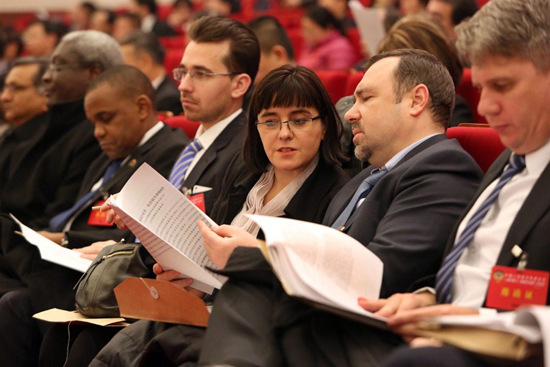Free trade zone is focus of advisers
 0 Comment(s)
0 Comment(s) Print
Print E-mail Shanghai Daily, January 19, 2014
E-mail Shanghai Daily, January 19, 2014
|
|
|
Officials from foreign consulates in Shanghai take part in the annual session of the city's political advisory body that opened yesterday. The city legislature opens its session today. [Photo: Shanghai Daily] |
Providing advice on the development of the recently opened Shanghai free trade zone will be a focus of the city's political advisory body in the coming year, deputies heard yesterday.
Innovation in government management also featured among tasks highlighted at the Second Plenary Session of the 12th Shanghai Committee of the Chinese People's Political Consultative Conference, which opened at the Expo Center.
The 29-square-kilometer free trade zone was launched in late September as a test bed for China's leadership's drive to deepen market-oriented reforms.
Chairman of the standing committee of the 12th CPPCC Shanghai Committee Wu Zhiming told delegates that they have a vital role to play in the city.
"Shanghai is at a key stage of reform and overcoming difficulties. We need political advisers to give their voices and serve the city better," said Wu.
Yesterday's session set the main tasks for this year and recapped on work during 2013.
Almost 800 deputies attended, joined by representatives from foreign consulates in the city.
The meeting adopted a report on how proposals from CPPCC members had been handled since the last session.
Up to January 8, some 951 proposals had been submitted by political advisers on Shanghai's economic development, democracy, legal system, culture and environment.
Topics covered everything from renovating old lifts and strengthening food safety monitoring to promoting international courses in local high schools.
Seventy-four proposals addressed pollution, a key concern of city residents. Air pollution last month was the worst on record.
"Expats will not complain too much but simply leave Shanghai if the air pollution is beyond their scope to endure," Piter de Jong, Shanghai branch manager of Holland's ING Bank NV and a committee member, told Shanghai Daily.
De Jong said the city government should coordinate with governments in neighboring Jiangsu and Zhejiang provinces to tackle this together.
"The air won't turn good if Shanghai closes polluting factories while factories in neighboring provinces are still producing pollutants," de Jong said.
De Jong, who has lived in Shanghai for 15 years, said few people cared about pollution when he first came to the city.
He said it's good that the city government and local people are more aware of the problem and have made tackling it a measurable task.
Almost 75 percent of proposals were adopted or solved and just over 6 percent are to be solved. Just under 19 percent were kept for reference, deputies heard.
The Shanghai People's Congress, the city's legislative body, will hold its opening ceremony today at the Expo Center.






